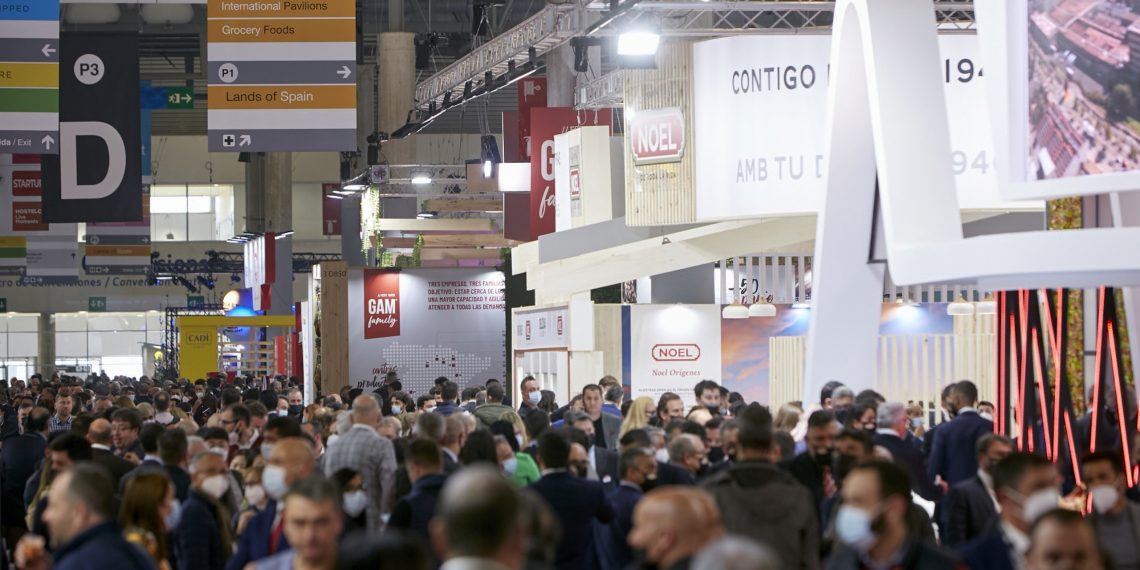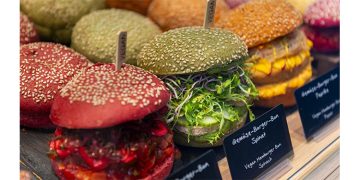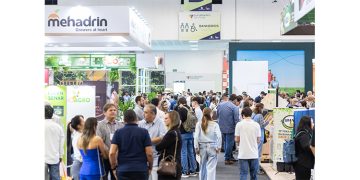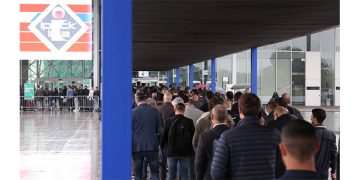Intercarn will bring together the best Spanish meat products and derivatives and will once again be the largest Food and Hostelco trade fair, which will be held from 18 to 21 March at the Gran Vía venue of Fira Barcelona. Consolidated as a first-rank exporting power, the Spanish meat industry will exhibit its products to buyers from strategic countries such as China, France, Portugal and Japan.
Alimentaria’s leading trade fair for business and internationalisation of the Spanish meat industry, Intercarn, will bring together 360 companies in the sector, 10% more than in 2022, and will occupy a space of some 14,000 m2. Among the exhibitors will be large companies such as Grupo Vall Companys, Grupo Jorge, El Pozo, Grupo Coren, Costa Brava Mediterranean Food, Noel Alimentaria, Jamones Aljomar, Costa Food Group, Grupo Norteños, BonÀrea and Companyia General Càrnia.
Nearly 150 small and medium-sized companies from all over the country will also participate – most of the meat production fabric is made up of SMEs – grouped into institutional participations from autonomous communities and provinces such as Castile and Leon, Catalonia, Huelva and Galicia and quality seals such as Jabugo, Jamón de Teruel, Sobrasada de Mallorca, Pedroches and Torrezno de Soria and sectoral associations. In total, Intercarn exhibitors will account for more than 70% of the sector’s turnover in Spain. In addition to this large Spanish representation, 90 foreign companies will be added, 25% of the total, with outstanding participations from Poland, Belgium, the Netherlands, Germany and Italy.
Spain, an exporting power
With the endorsement of its export leadership, this industry will seek new internationalisation opportunities at Alimentaria, which expects to attract 100,000 visitors, including some 24,000 buyers interested in purchasing Spanish meat products.
In this regard, and to maximise business opportunities, it has a powerful hosted buyer programme, thanks to which it will bring together more than 2,200 importers, distributors and purchasing managers of the highest level. Of these, more than half are from abroad: from strategic countries for the Spanish meat sector such as China, Japan, France, Italy, Portugal, Germany, South Korea and Mexico.
The high quality of supply and demand present at the event, with large importers and distributors from strategic markets, is the key to Intercarn’s success, according to its president and CEO of Noel Alimentaria, Anna Bosch: “Spain is a leader in meat production, quality, food safety and exports and has the best showcase in this show. It is the number one trade fair for business and the internationalization of the Spanish meat industry.”
Spain is one of the main meat exporting countries in the world and has China as the first market in volume (more than 560,000 tonnes) and the EU as the first in value (7 billion euros, 64% of the total). As for the foreign activity of the various sub-sectors that make up the Spanish meat industry, pork is the leader in exports and China is its number one market, followed by Japan, France and Korea. It is followed by beef, which grew by 15% in 2022 in export volume and which also has its sights set on China. The main foreign destinations for the poultry sub-sector, the one with the highest domestic consumption, are France and Portugal, whereas for sheep and goats the main customers are France, Portugal, and the Arab countries.
The challenges of a key industry for the economy
The food sector and the meat sub-sectors are, together with the automotive and chemical sectors, the powerhouses of the Spanish economy. The meat industry is the fourth-ranked industrial sector in Spain and its turnover (more than €33,218 million in 2022) accounts for more than 23% of the entire Spanish food industry, according to data from the Government of Spain. It also leads the sector’s exports and is the largest employer in the food industry, with more than 118,000 direct jobs (24.7% of the total). In addition, according to data from Nielsen, meat products closed 2023 with an increase in demand in Spain of +2.7% in volume and annual meat consumption per capita has also grown slightly, exceeding 32.4 kg per capita. Sales of ready-to-eat meals have grown by 7%.
All this power of the Spanish meat industry will be seen at Intercarn, an event that will also analyse some of the main challenges facing the industry, such as new trends in meat consumption, the sustainability of its production and its role in the development of the rural economy and territorial balance.
Along these lines, the IRTA (Institute of Agri-Food Research and Technology) will organise a debate with producers and distributors at the show which, under the title ‘Red to green meat’, will focus on how to produce quality, competitive and more sustainable meat in the future. In addition, Intercarn and AECOC (Association of Manufacturers and Distributors) will present a joint study on the new purchasing and consumption habits of meat products internationally and how to adapt to them successfully. In addition, associations and organisations of the livestock-meat sector such as Interporc, Fecic, Anafric, Intercun, Provacuno, among others, will organise several events and talks as well as welcoming international guests.
Alimentaria & Hostelco 2024, organised by Alimentaria Exhibitions, a Fira Barcelona company, anticipates the attendance of around 3,200 exhibiting companies, which will occupy a net surface area of 100,000 m2 and 7 halls, practically the whole of Fira Barcelona’s Gran Vía venue. It also expects to receive more than 100,000 professional visitors, reaffirming its leadership as the main platform for promoting business, internationalisation and networking.


















